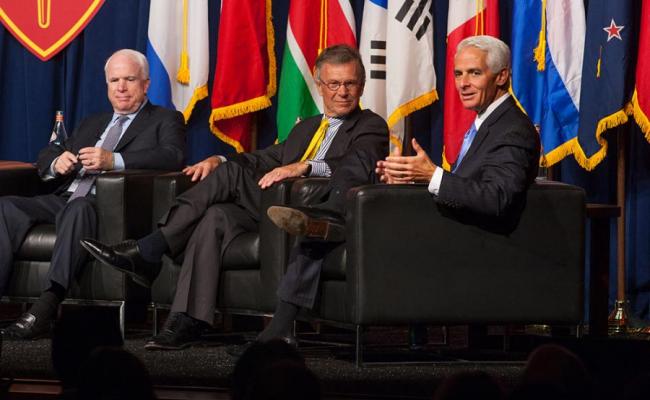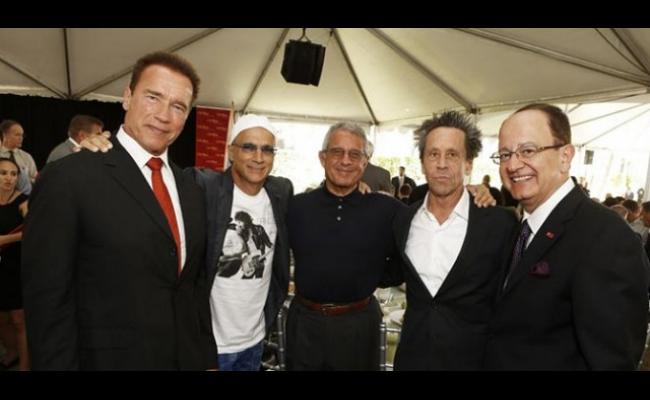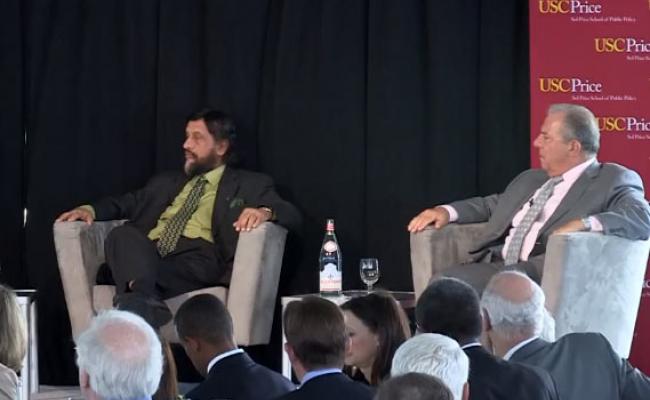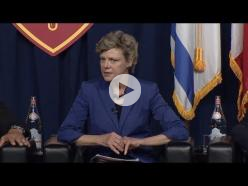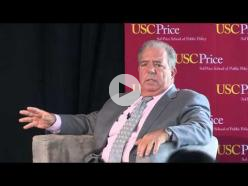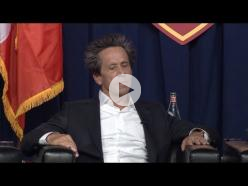|
Highlights from Political Leaders on Post-Partisanship |
Highlights from Local Solutions to Global Challenges — Environment, Energy, Climate |
Highlights from Hollywood Leaders on Innovation and the Power of Media |
Panel Discussion Highlights
|
Political Leaders on Post-Partisanship |
Local Solutions to Global Challenges — Environment, Energy, Climate |
Hollywood Leaders on Innovation and the Power of Media |
|
Featuring:
|
Featuring:
|
Featuring:
|
USC president C. L. Max Nikias and former California governor Arnold Schwarzenegger, the university’s inaugural Governor Downey Professor of State and Global Policy, hosted the opening symposium of the USC Schwarzenegger Institute for State and Global Policy on Sept. 24, 2012. The event, which drew nearly 1,000 attendees and more than a dozen national and international news media outlets to the University Park Campus, featured thought leaders from the realms of politics, science and entertainment who participated in panels on “Political Leaders’ Views on the Importance of Post-Partisanship,” “Local Solutions to Global Problems” and “The Power of People and Innovation.”
Reflections on leadership from the inaugural symposium
By Kevin Starr, University Professor of History, USC
A number of years ago, I chanced to be sitting in the late evening with California Governor Arnold Schwarzenegger and Assembly Speaker Robert Hertzberg poolside at the Beverly Hilton Hotel. I was walking by an alcove near the pool when I heard two familiar voices, those of the Governor and the Speaker, and, good civil servant that I am, I stopped to say hello and remained on for a fascinating hour’s conversation.
Being as I am an astute observer of detail – and this particular detail was hard to miss – I noticed that the Governor was wearing a rather impressive pair of hand-tooled cowboy boots embossed with the Great Seal of California, the Bear Flag, and other California-related iconography. I also remember the Governor saying: “The day I leave office, I will continue to work on behalf of California.” How exactly the Governor intended to do this remained an open question.
On Monday 24 September 2012, I was part of a crowd of a thousand attending the inaugural event of the USC Schwarzenegger Institute for State and Global Policy. The former Governor was not wearing his hand-tooled cowboy boots that morning, but he was still larger-than-life as he moved through the crowd, meeting and greeting with his usual exuberance.
A certain sadder-but-wiser look had come into his gaze and demeanor: the result, no doubt, of the personal difficulties he was enduring as well as the maturing effect that the advance of years will have even on an action hero.
Arnold Schwarzenegger is a name, a brand, a myth, a reputation simultaneously in Technicolor or black and white, which the Governor has always effectively marketed with efficiency and panache.
However vivid the chiaroscuro of the Schwarzenegger legacy, on 24 September, with the inauguration of the Institute, the best possibilities of the Governor as a political person committed to post-partisanship were being institutionalized. Whatever Arnold Schwarzenegger has been – body-builder, film star, politician – whatever virtues and, certainly, whatever faults he has shared, willingly or unwillingly, with the public, his best political instincts had led him to the University in general as an institution and the USC Sol Price School of Public Policy in particular.
It takes men and women to create institutions, including universities; but the institutions and universities they create — if successful, if they do their work properly — live long after those who endowed such institutions pass into history. Throughout the day on the 24th, Arnold Schwarzenegger was – well, how should I put it? — was Arnold Schwarzenegger. But like others who gathered to join in the day’s discussions, he already had a place in the history of his times; and now, through the Institute, he was finding a way to anchor his name and his aspirations for California, to which he had come as a young immigrant, into a University that had helped bring Southern California into being.

